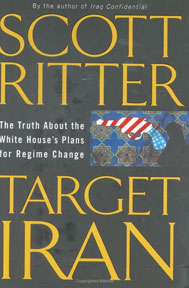
Genie out of the bottle
Multilateral policies are being adopted that will effect the Nation of Iran in particular and the entire Mideast and possibly far beyond in general for many years to come
December 23, 2006
iranian.com
The intractable problem of what to do with the Islamic Republic of Iran's dogged attempts in pursuing its destabilizing nuclear ambitions tops the agenda of many, mostly democratic, governments. While negotiations for an acceptable wording of a sanction instrument progressed at a snail's pace, hampered by attempts to water it down to next to nothing, the outline of a robust multifaceted US response is emerging.
Aside from participating in the Security Council's sanction rout that the US and some of her European allies are publicly pursuing, multilateral policies are being adopted that will effect the Nation of Iran in particular and the entire Mideast and possibly far beyond in general for many years to come.
The first front in the US response is being commanded by the Treasury Department in the form of friendly advice to international financial institutions who know better than to forgo such advice. The treasury is asking of them to curtail and eventually cut off any and all relationship and services that they have been providing the IRI' myriad of foundations, institutions, front companies, officials, agents, intermediaries and international gofers. The second prong of the policy consists of more vigorous prosecution of alleged wrongdoings by IRI through justice system of mostly democratic countries.
One only needs to notice the surge in the number of IRI related cases that are being filed on an almost daily basis in the US, European and other courts. The instances of other international bodies that take exception to the IRI has increased as well, the latest being FIFA. Next to last but certainly not the least is the tasking of naval armada to patrol the Persian Gulf and stationing other naval assets close enough to be able to flex their muscle should the need arises.
In fact there are so many aircraft carriers, accompanying cruisers, frigates, destroyers and submarines of different flag in the area that with a little imagination envisioning them end to end across the vital twenty or so mile wide Strait of Hormuz allows a pedestrian to cross the Strait without getting his feet wet. It would also be a safe assumption that some surreptitious activity and alike is afoot as well.
 Lastly, a glimpse of the most troublesome aspect of the policy outline was afforded all by the much talked about and soon forgotten op-ed article by a Saudi political adviser in the Washington post. Sudden resignation of the disagreeing former long time head of Saudi intelligence who had assumed the ambassadorial position in the Washington for just fifteen months only lent weight to the authenticity of the content of the article. The article essentially enumerated a plan for sectarian conflict bankrolled by regional powers in the Middle East. Lastly, a glimpse of the most troublesome aspect of the policy outline was afforded all by the much talked about and soon forgotten op-ed article by a Saudi political adviser in the Washington post. Sudden resignation of the disagreeing former long time head of Saudi intelligence who had assumed the ambassadorial position in the Washington for just fifteen months only lent weight to the authenticity of the content of the article. The article essentially enumerated a plan for sectarian conflict bankrolled by regional powers in the Middle East.
Of all the above the only one that is even more worrisome as far as implication of it on the ground is concerned, even more than the possibility of a military confrontation, is the resulted conflagration of a fanned and funded sectarian conflict by regional states. Although the kingdom of Saudi Arabia and the Islamic Republic of Iran are both old hands at this and been going at each other through proxies for nearly thirty years, but at no time has the situation been as dire as now.
Both Riyadh and Tehran have funded and managed their respective proxies in Afghanistan, Pakistan, Bahrain, Kuwait, Yemen and Lebanon to just name a few. Of these till liberation/occupation of Iraq, the ones in Afghanistan and Pakistan had produced the most body counts through senseless slaughters and mayhem of two rival Shia and Sunni Moslem sects. And now Iraq's daily pogroms have far surpassed all the previous bloodbaths in the past century.
Of course history of the region reminds us of many terrible periods when sacking of one another's religious shrines, raping and pillaging of the rival was an almost a routine happening. The current shrine of the most revered Shia saint, Imam Ali in Najaf Iraq, has been razed to the ground by the rival sects more than once resulting in the Shia revenge begetting the other side's revenge and so on.
The genie of a wholesale sectarian conflict has been locked up in the bottle for the better part of a century, this religious shenanigan as an instrument of foreign policy is adventurism of the worst kind. Middle East is too vital a region to be toyed with half baked ideas that are copycatting the Al Qaeda and morally bankrupt regimes grasping at straws to keep the power for one more day. This kind of deliberate fire setting not only does not clear the troublesome underbrush and dead woods; it vaporizes the very saplings that with the right policy and initiative can grow to spread the soothing shade of democracy in the region. Comment
|